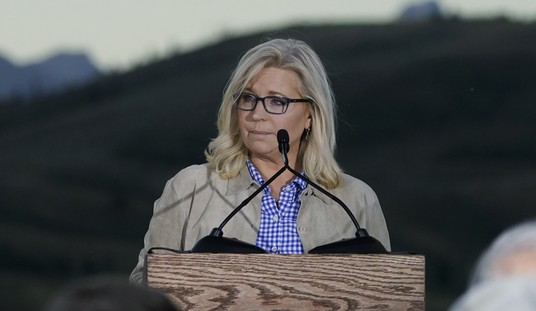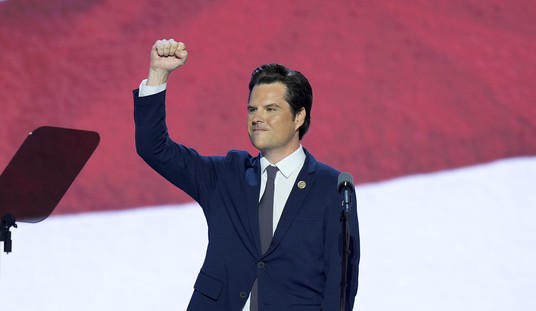Hell is often described as a separation from God. Whether your theology leads you to believe in actual demons or not, in the 21st century, we are doing an excellent job of shoving God to one side, relegating Him to 90 minutes on a Sunday morning or a hastily mumbled prayer over dinner.
C.S. Lewis once said that prayer can sometimes seem like constantly mailing letters to someone and never getting a reply. And when you work for an outlet like PJ Media and spend your days perusing the headlines, God may seem distant, aloof, or even absent.
But Rod Dreher in "Living in Wonder: Finding Mystery in a Secular Age" posits that God is not so hard to find, provided we are willing to look for Him. In the final installment of the transcription of my interview with Dreher, we talk about finding the way back.
Listen or read the rough transcript below:
Lincoln Brown: But how do we get away from the false enchantment, whether it is the occult, psychedelic drugs, the internet, or whatever our fixation is in that pursuit, and get to the real enchantment? You talk about several people who have had some wonderful experiences out there, including Martin Shaw. We don't all have those miraculous experiences. We can't, like Mr. Shaw did, go into the woods behind our house and meditate in an Iron Age fort. We don't all have that luxury. How do we get to legitimate enchantment?
Rod Dreher: Right. Well, the most ordinary form of enchantment is through prayer. Through constant, frequent, regular prayer. Marshall McLuhan, the great Canadian media theorist of the mid-20th century, was a faithful, practicing Catholic, and he talks about the difference between what he calls percept and concept.
A percept is something you perceive through your senses. It's raw experience. Concept is what happens when you turn it into an idea. You have to have concepts in order to talk about religion, for example, a bit about moral theology, all that sort of thing. But, says McLuhan, when we lose the percept and we allow our faith to become nothing but concept, nothing but ideas and propositions, then the faith begins to die. He said that the most common way for people to activate the percept or live in the percept is through prayer.
Others have mystical experiences. And, of course, if you're depending on the kind of Christian tradition, you have the Eucharist as part of it. Worship is part of it, but prayer is the most ordinary way. McLuhan said that everyone he ever knew who lost their faith began by ceasing to pray. So, I would say the most important thing any of us can do to get back on the path to enchantment is to pray.
Now, I also talk in the book; even though I write this book, I'm open about the fact that I'm an Orthodox Christian. But it's not a book of proselytization to try to get people to become Orthodox. Although, if they should finish the book, they want to be Orthodox. Good for you. But it's not written with that in mind. It's written to talk about ways that ordinary Christians can change our way of being, our way of praying, our way of living, to make it more likely that we can sense the presence of God.
I mentioned prayer, of course, but one of the most important things we can do is change the way we attend to the world. I quote in the book Iain McGilchrist, the great British psychiatrist who's written some amazing books about brain hemispheres and the way they construct our sense of reality. Both he and Matthew Crawford, the philosopher, talk about the way we attend to the world is, how it appears to us as real. And if we lose our ability to focus attention, we're going to lose our ability to perceive God. There's something in our psychological makeup as human beings that requires focused attention in order to be able to hear the still, small voice of God, and not just in, you know, in the vocal sense, but just perceive Him.
So, one of the things we can do is stop spending so much time online. I accuse myself here because I work online. I'm online all the time, and I bet you've had this too. A lot of people have. It's so much harder to pay attention. The more time I spend online, the harder it is to pray, and we have to learn how to discipline ourselves. One of the great things I learned about from being an Eastern Orthodox Christian for the last eighteen years is the importance of spiritual disciplines. We don't fast, for example, for the sake of, like, let's do without food. Fasting has a purpose, and its purpose is to hone us, to help us overcome our bodily passions, to make that sacrifice so we can become more attuned to the spiritual world. There are all kinds of things we can do, little fasts, not just from food, but from pleasurable things, and sacrifices we can make so we can become more attuned to God.
Now, one of the things I say early on in the book is that there was a Harvard professor named Elaine Scarry who was talking about education. She said true education is not transferring information from teacher to student. True education, rather, is the teacher helping the students to be staring at the right corner of the sky when a comet goes blazing past. Well, I think that's true also for enchantment. I can't sit here and give you a five-point plan for re-enchanting your life. It doesn't work that way, right? What I can do is suggest — and I do this all in the book — is suggest things that you can do in your life to make sure you're staring at the right corner of the sky when God reveals Himself through whatever way He chooses.
L B: I had a reader just yesterday send me a message, and he is a divinity student, or he was a divinity student. I don't know if he's in the ministry or not, but he got his master's degree, and he said, “I really want to know what made you leave evangelicalism and go to Orthodoxy?” And I thought, “Well, how much time does he have?” It's not like shopping for a new barber. It really is not, not that at all. But I think that for me, what I found in Orthodoxy that I did not find in other religions, and I think that the Episcopal Church, the church of my birth, still goes through the motions, but it's missing some key components from its liturgy. But in Orthodoxy, it isn't just that we have smells, bells, and yells and we have icons. It is the way that you interact with all of those things, the fact that when the moment of Transubstantiation occurs, you are either kneeling with your head down or, in some cases, you have your face on the floor. There really is that moment when transcendence does occur, and it occurs in part because of what we do.
R D: Yeah, and you respond to it with your body. When I was working on my book, “The Benedict Option,” probably my best-known book, I came across this amazing little book by an English cultural anthropologist named Paul Connerton. It's called “How Societies Remember.” Now, Connerton was a Marxist. He was not a religious man, but what he was interested in was how smaller traditional communities held on to their traditions in the face of the dissolving currents of liquid modernity. And he found out with all the different ones he studied, they had a few things in common.
First of all, they had a sacred story that they believed told them who they were and who they are. Second, they celebrated this sacred story in an unchanging ritual. Third, when they celebrated this ritual, the community had a sense that they were being taken outside of time. They were being connected to eternity. And fourth, they celebrated this ritual using their body. And Connerton said — it's a beautiful phrase — he said, “Praying and celebrating this liturgy with your body sediments the story into your bones.”
Now, when I read that this, this Marxist said this, I thought, this is Orthodoxy. This is why, for me, Orthodox Christianity has been so powerful because it got me out of my head. I remember when I was first becoming Orthodox, back in 2006, I went to the priest at the cathedral in Dallas where we were. I said, "Okay, so what do I need to read to know what it is to be Orthodox?" He said, "Well, there are books you can read, but that's not going to be the real thing. The real way to become Orthodox is to come to church and to keep coming to church, keeping the fast, keeping the feasts, and on and on." And I began to understand that for the Orthodox to become orthodox is more like learning how to play the violin than mastering a bunch of information to regurgitate on an exam. It's something that you do that becomes sedimented into your bones.
And that's, frankly, that's one reason why I go so heavy on Orthodoxy in this book. It's not to proselytize, but it's to say, look, we in the Eastern Church have remembered some things about the faith and about human nature, our embodied nature, that can help you Western Christians who are so stranded in your head, get out of it and to experience the living God in ways that all Christians used to before the modern era.
LB: It's interesting that you bring up the quote about stories and traditions because you mentioned that now there is an accelerated move toward enchantment, be it a good direction or a bad direction. But I would posit it's been going on for a while. You know, the devotion to Star Wars, that is a canon that has spoken to many people, even the stories of Harry Potter resonate. You know, we will, in the absence of the transcendence, we will make up something that is transcendent.
RD: Sure, sure. Yeah, in fact, there's an argument I talk about this a little bit in the book, that we've never been disenchanted, that we just shifted enchantment. And after the Industrial Revolution and when mass capitalism was coming into existence, people began to enchant money. There's a Catholic historian, Eugene McCarraher, who wrote a book called “The Enchantments of Mammon,” and that's his argument in the book, that you know, we just began in the West, as we grew richer, we began to fetishize money and material things as signs of grace and the things we really valued most of all. Because really, that's what enchants you, the thing you value most of all, the thing you see as your god.
And that's why I want to when I'm writing this book when I talk about enchantment, I mean in a specific Christian way of coming to believe: that God is everywhere, present, and fills all things, and you can connect with Him in a visceral, perceptive way. And second, that there is such a thing as ultimate meaning that we can know. That is what I mean by "to be enchanted." And I put this in contradistinction to the idea that, well, who knows anything you know? Who knows if God really exists, etc., etc.? But you're right, Lincoln, to say that people can't live with too much disenchantment. They're going to find something there to give them a sense of meaning and purpose because that's how we're made. We're made for this.
LB: To take it kind of back full circle to where we started in the Kingsnorth comment about the spiritual wells when we got married, my wife announced that I was taking her to Ireland for our honeymoon, being a good husband. Okay, I was thinking we'd go to Yellowstone, but I guess we're going to Ireland.
RD: The Guinness is better in Ireland than Yellowstone.
LB: It is. I learned how to drink a proper Guinness in Ireland, which we don't do in the United States, and I keep that tradition to this day when I have a Guinness. But she booked us a really neat little side trip. It was a hike up an Irish mountain. Now, in southern Ireland, there are not too many dramatic mountains. What passes for a mountain there is not what we get here and in other parts of the world. But we got almost to the summit, and our guide began to point out, It was just she and I, and the guy pointed out churches that had stood, the ruins of churches that had been there for a thousand years.
Outside of Native American ruins in the U.S., you're not going to find anything that has been around for a thousand years. And then he pointed us to this other place and he said that over there, and I forget the term he used, but it was a spirit well, and we walked out to see it. And what was interesting was, when you looked into the spirit, well, people were still visiting it, and they were still leaving things, even though officially it was no longer part of the church, people were still going there, even in 2008.
RD: Yeah, I went to visit Paul Kingsnorth and interviewed him for this book. And he took me to see some of these wells, holy wells. And he even took me into the Burren, this desolate part of Ireland's West Country. And we visited the cave of St. Colman, who was a seventh-century monk who lived in that cave for seven years, praying and fasting, and he was eventually called out and made a bishop. But Paul took me there. You can go in the cave. I went in there and sat there and prayed with my prayer rope for twenty minutes. Paul has spent nights in that cave.
And Christianity, ancient Christianity, is embedded in the landscape there, in Ireland, in such a way that, according to Paul, he said, “You know, Ireland is in really bad spiritual shape now because of the abuse scandal and all kinds of things. But it's going to come back.” And it's good that Christianity will come back there because it will be what Paul and Martin Shaw called “Bush Christianity.”
It's from this wild experience of the sacredness of the landscape. Now, you have to be careful because that can easily tip over into paganism and the worship of, you know, false pagan gods that are connected to that, or worship of the natural world itself. But this but Ireland has been Christian for so long, and there have been Christians praying and living in those caves and those ruins and going to visit those holy wells for so long, it's still there. It just has to be rediscovered.
LB: Rod Dreher, the author of “Living in Wonder: Finding Mystery and Meaning in a Secular Age.” Sir, I appreciate your time today. Where can we find the book?
RD: Oh, the book is everywhere. It's on Amazon, in your local bookstores. There are even at Eighth Day Books in Wichita, Kansas, www.eighthdaybooks.com. They have a limited number of signed copies. So go to eighthdaybooks.com and get a signed copy. Otherwise, get it at your favorite retailer. And your listeners might want to read my substack, roddreher.substack.com. I write every single day, every single weekday, and sometimes on weekends. I'm a workaholic, and I write about politics, religion, culture, and wonder










Join the conversation as a VIP Member